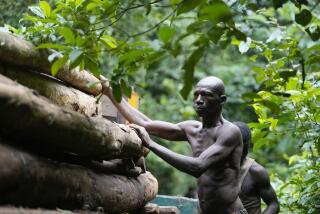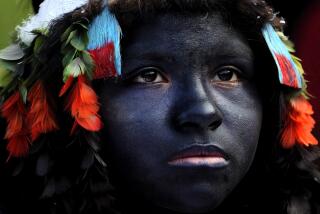Nomadic Tribe Slowly Gives Up Fight to Preserve Their Ways
- Share via
LONG GALOH, Malaysia — Dressed in loincloths and proudly shouldering blowguns, the old Penan men dream of the times they roamed free in the great forests of northern Borneo, hunting boar, eating wild sago, sheltering under the leaves.
Now the forest is much thinned by logging, and the boar are scarce. The Penans are rooted to wooden huts on stilts. Their sons wear sweatpants and no longer stretch their earlobes to insert the teeth of wild animals.
“The waters were clean, and when we were sick we found medicinal plants. It was so cool in the forest; now it is hot,” said Pada No, chief of this jungle village linked to the outside world by the Pahtah River.
As women prepared dinner on an open fire, the elders told tales of lost times. Reminded that in their nomadic days, many babies died in childbirth and entire families were felled by diseases that herbs and roots couldn’t cure, they nodded--and talked on.
It is this resistance to change--and a losing fight against loggers and the government in Sarawak, a Malaysian state in north-central Borneo island--that has made the Penans symbolic of indigenous people trying to preserve their environment and traditional ways.
Since 1987, they’ve thrown up human barricades trying to stop timber companies from entering tribal lands and destroyed logging machinery. Several hundred have been jailed. They’ve taken their case before courts and to the Malaysian capital, Kuala Lumpur, striding past skyscrapers bare-chested and adorned with hornbill feathers.
The government contends that the unrest is instigated by environmental groups and Western “romantics” such as Bruno Manser, a Swiss who lived with nomadic Penans in 1983-1990 and publicized their cause worldwide.
Rather than preserve their lifestyle as Manser advocated, the government’s basic policy is to bring the Penans into the modern Malaysian mainstream.
Malaysian conservationists say the Penans’ protests stem not from agitation by environmentalists opposed to widespread logging, but to a realization that their survival as a people is at stake.
While others among Sarawak’s 26 major ethnic groups also are being pummeled by rapid change, the 10,000 Penans--especially the several hundred still clinging to nomadic life--are deeply bound to the rain forest for their physical and spiritual well-being.
Even the settled Penans maintain bonds, being no more than a generation away from hunter-gatherers and still trying to learn basic farming.
“We are the poorest people in this country and yet it seems the government just wants to kill us,” said Liman Abon, chief of another Penan settlement, Long Block. “They say we are very lazy, but we want to search for a livelihood in the forest and cannot.”
Adults crowded into Abon’s bamboo hut spoke in turn about how the Penans had gradually lost rights over their ancestral lands since the British ruled this part of Borneo.
Ringed by cloud-streaked hills and forests--but also logging trails--Long Block was established by about 200 Penans when they gave up their nomadic existence in the 1970s.
Their rice plots and fruit trees don’t yield enough to live on. So the residents still go into the forest to hunt boar, mouse deer and monkeys as well as medicinal plants, poison for their arrows and fragrant eagle wood, which fetches a high price.
But now the Penans must spend days venturing ever deeper into the forest where the fruits favored by boar and the precious wood has not yet fallen to saws and bulldozers.
“We were not rich with money, but rich with food. Before the logging came, we never asked help from the government because we had enough to eat,” Abon said.
Some help has come to Long Block from the government and logging companies: piped water, toilets, a nearby school some of the children attend.
The government also says it has set aside 31,600 undisturbed acres where Penans can choose to live as they like. But all the leaders interviewed said they had not been informed of the plan.
The Penans’ supporters are pessimistic.
As logging moved from Sarawak’s coast into the interior, the Iban, Kayan, Kenyah and other groups also tried to resist. But all eventually gave up. Some communities turned pro-logging as the men picked up relatively lucrative jobs with the companies.
Even the Penan protest appears to be subsiding.
“Most of the people don’t like conflict. They feel they are cornered, so slowly their spirit is sapped,” said Thomas Jalong of the Malaysian affiliate of Friends of the Earth, an international conservation group.
“They choose to live with whatever comes.”
More to Read
Sign up for Essential California
The most important California stories and recommendations in your inbox every morning.
You may occasionally receive promotional content from the Los Angeles Times.













